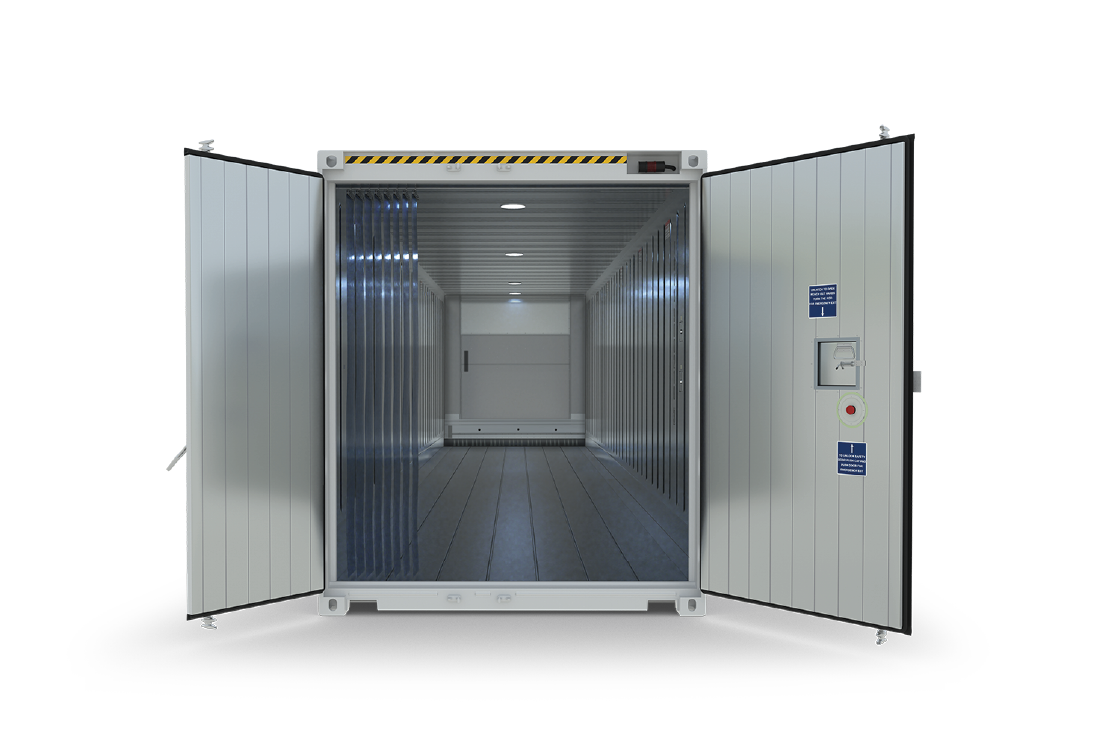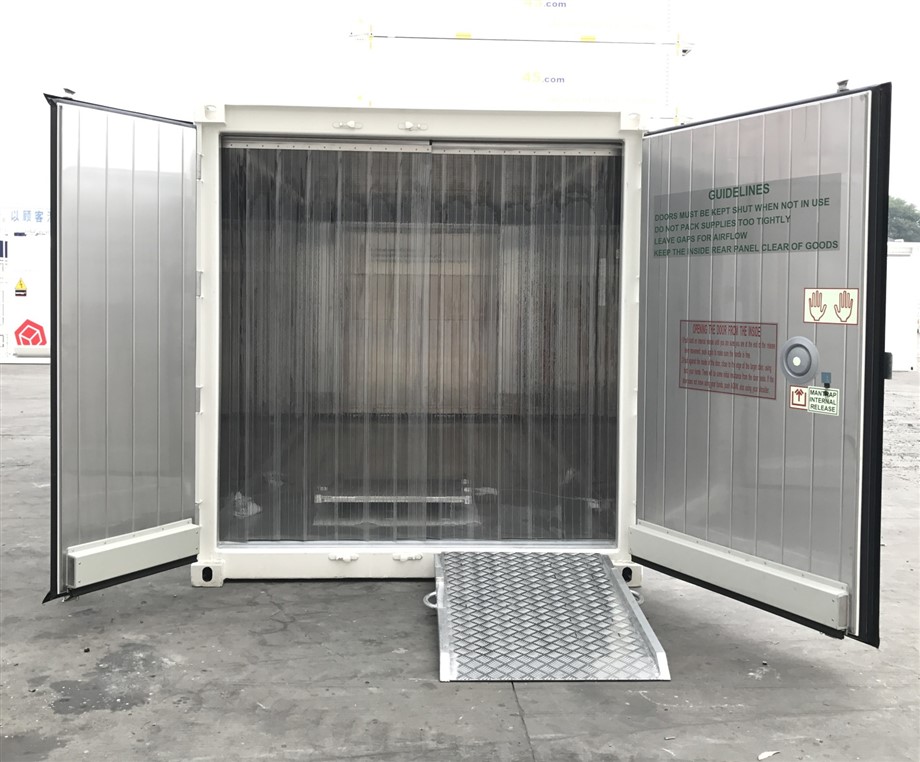Everything About Cold Store Containers: Vital Insights for Your Storage Requirements
Cold storage containers play an essential role in the conservation of disposable products. They can be found in numerous types, consisting of refrigerated and insulated devices, each created for particular storage needs. Understanding the benefits and key functions of these containers is necessary for organizations aiming to enhance their procedures. As the demand for efficient storage space solutions grows, exploring the different choices readily available can result in educated decisions that affect both earnings and sustainability. What aspects should one consider when choosing the right container?
Sorts Of Freezer Containers
Cold store containers come in various types, each designed to fulfill particular temperature control needs. Among the most usual kinds are chilled containers, which keep temperature levels in between 0 ° C to 10 ° C, making them ideal for subject to spoiling items like fruits, veggies, and milk products. Another kind is the deep freezer container, which operates at temperatures below -18 ° C, ideal for lasting storage space of frozen products such as meats and fish and shellfish.
Insulated containers supply temperature stability without energetic air conditioning, making them beneficial for short-term transportation of temperature-sensitive products. Furthermore, there are mobile freezer systems, which supply adaptability in locations and are typically used in events or seasonal procedures. Finally, blast chillers quickly reduce the temperature level of warm foods, making certain security and quality. Each type serves a special objective in numerous industries, from food solution to drugs, stressing the significance of selecting the ideal container for certain storage needs.

Benefits of Using Freezer Solutions

Cool storage options extend the shelf life of products, lowering waste and increasing success for companies. By successfully managing supply with appropriate temperature level control, firms can enhance their supply chains and boost operational effectiveness.
Additionally, cold store facilities permit adaptable storage choices, fitting various volume requirements and seasonal variations popular (used 40ft refrigerated shipping containers). This versatility helps organizations react quickly to market modifications
Last but not least, utilizing cold store options can ensure conformity with health and wellness and safety and security guidelines, protecting both customers and businesses. On the whole, the critical usage of cool storage boosts product management while promoting sustainability and financial feasibility.
Key Features to Look for in Cold Store Containers
When selecting cold store containers, several essential functions quality careful factor to consider to safeguard peak efficiency and integrity. Initially, temperature level control capabilities are crucial; containers should maintain consistent temperatures suitable for particular goods. Insulation high quality additionally plays a significant duty, as remarkable insulation minimizes energy usage and enhances temperature stability.
Next, convenience of accessibility and loading is vital; containers ought to supply user-friendly designs for efficient handling and organization. Sturdiness is another vital element; weather-resistant products assure long life and safeguard contents against ecological factors.
Furthermore, wheelchair attributes, such as built-in wheels or lifting factors, facilitate transportation, while customizable formats enable tailored storage services.
Lastly, monitoring systems, including temperature alarm systems and remote monitoring, give real-time updates, making sure that conditions stay suitable. By concentrating on these functions, customers can select cold storage space containers that fulfill their operational demands successfully.
Picking the Right Cold Store Container for Your Demands
Choosing the right chilly storage space container needs a thoughtful evaluation of operational needs and details demands. Elements such as the type of products being kept, temperature sensitivity, and quantity should be prioritized. Subject to spoiling food things may require containers with rigid temperature controls, while pharmaceuticals might call for precise conditions to maintain efficacy.
Additionally, possible customers need to consider the container's dimension and wheelchair. A larger system might be needed for bulk storage, while smaller sized, portable alternatives might be ideal for on-site or short-lived demands. Insulation top quality and energy efficiency are additionally crucial, as these will certainly affect operational costs and temperature level security.
Compliance with industry policies and standards is crucial, especially in fields like food and medical care. By very carefully reviewing these aspects, individuals can choose a freezer container that properly meets their distinct demands and guarantees optimum storage space problems.
Ideal Practices for Preserving Cold Store Conditions
Maintaining optimal cold store conditions is vital for preserving the high quality and security of temperature-sensitive products. Regularly monitoring temperature level and humidity levels is vital; making use of reliable digital thermometers and hygrometers can supply precise analyses. Moreover, correct insulation of freezer containers assists minimize temperature fluctuations and power loss.
Implementing a first-in, first-out (FIFO) system ensures that older stock is made use of before more recent stock, minimizing waste (used 40ft refrigerated shipping containers). In addition, keeping an organized format within the storage room enables much better air flow and lessens the risk of cross-contamination
Routine maintenance examine tools, such as seals and compressors, are very important to avoid breakdowns. Staff training on finest methods for loading and dumping items helps maintain temperature level integrity. Lastly, keeping doors shut as much as possible restrictions heat exchange, ensuring that the cool storage setting continues to be secure and reliable in protecting beneficial products.
Cost Factors To Consider for Cold Storage Space Solutions
When reviewing freezer options, it is important to consider the initial investment prices alongside continuous operational expenses. A thorough malfunction of these prices can expose considerable long-term cost savings possibility for businesses. Understanding these economic elements assists stakeholders make notified choices concerning their freezer demands.

Preliminary Investment Prices
The monetary landscape of cold storage containers offers various preliminary financial investment prices that organizations have to consider. These expenses typically consist of the purchase or rental price of the containers, which can vary based on size, insulation, and kind top quality. Furthermore, costs associated with retrofitting existing frameworks to suit chilly storage should be factored in, particularly if specialized equipment is needed. Setup costs, including electrical job and refrigeration systems, additionally add to the overall first financial investment. Businesses need to not neglect transportation expenses for providing containers to their preferred area. Potential customization alternatives, such as shelving or temperature monitoring systems, can even more influence the first financial expense. Mindful budgeting for these elements is important for successful cool storage space implementation.
Functional Expenditures Breakdown
Operational expenditures for cold store solutions include a number of important cost factors to consider that services should navigate. Secret aspects include energy expenses, which can be substantial because of the need to preserve low temperature levels. Maintenance expenses are also considerable, as routine maintenance is necessary to guarantee equipment runs successfully and continues to be certified with health and safety standards. In addition, labor expenses may occur from the demand for specialized staff to take care of and check the storage space environment. Insurance costs are another consideration, as business should safeguard their financial investments against potential losses. Any type of prospective regulatory compliance prices have to be factored in, as organizations may need to spend in systems that stick to food safety and environmental laws. Recognizing these expenses is vital for reliable budgeting.
Long-Term Cost Savings Potential
Purchasing freezer options uses significant long-lasting savings potential, transforming initial expenses into economic efficiency gradually. By minimizing perishing and waste, businesses can boost their profit margins substantially. Advanced insulation and energy-efficient systems decrease utility expenses, which collect over the lifespan of the devices. Cold storage space containers typically call for less frequent maintenance compared to conventional refrigeration approaches, leading to reduced repair expenses. The capacity to shop items for prolonged durations without compromising quality enables companies to profit from market fluctuations, enhancing profits. Furthermore, the scalability of cold storage services allows firms to adapt to altering needs without incurring excessive expenses. Overall, these elements add to an engaging situation for freezer as an affordable financial investment approach.
Often Asked Inquiries
How Lengthy Can Food Be Stored in Freezer Containers?
The duration food can be kept in cool storage containers varies by kind. Generally, perishable items last from days to weeks, while icy foods can remain risk-free for months, relying on appropriate temperature and storage space conditions.
Are Cold Storage Containers Energy-saving?
The energy performance of freezer containers differs based upon design and insulation quality. Modern devices usually use sophisticated modern technology to reduce power consumption, eventually adding more info to reduced operational prices and ecological influence in long-term usage.
Can Cold Storage Containers Be Customized for Details Demands?
Cold storage containers can without a doubt be personalized to fulfill specific needs. Modifications might consist of temperature controls, size changes, and additional attributes, allowing individuals to customize solutions properly for various storage space requirements and functional preferences.
What Are the Usual Sizes of Freezer Containers?
Freezer containers usually are available in basic sizes such as 10, 20, and 40 feet. These dimensions suit numerous storage requirements, guaranteeing versatility for companies requiring temperature-controlled atmospheres for subject to spoiling items or sensitive materials.
Do Cold Store Containers Require Unique Authorizations for Usage?
Cold store containers typically call for special authorizations for usage, relying on neighborhood policies and meant applications. Authorities might mandate authorizations to guarantee safety standards, environmental compliance, and correct operational techniques are preserved throughout their use.
Cold storage space containers come in various types, each developed to meet particular temperature control demands. Additionally, cool storage centers permit for versatile storage choices, fitting various volume demands and seasonal fluctuations in need. Choosing the right cold storage space container calls for a thoughtful evaluation of functional needs and certain requirements. The economic landscape of cool storage space containers presents numerous preliminary investment costs that organizations must take into consideration. Cold storage space containers can certainly be customized to fulfill details demands.